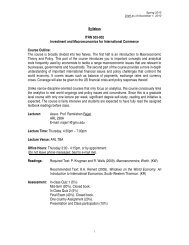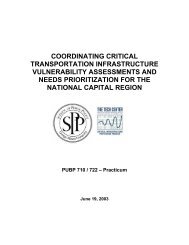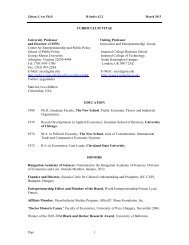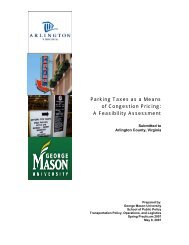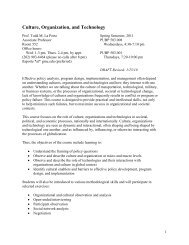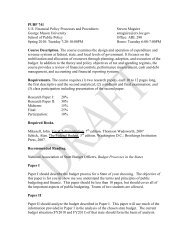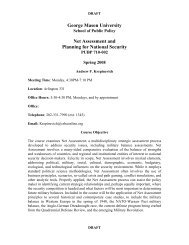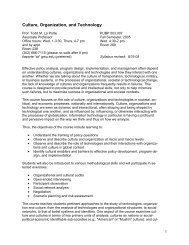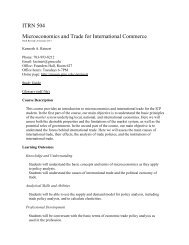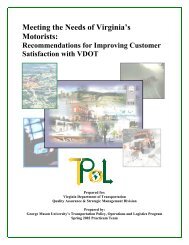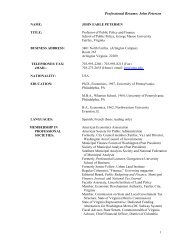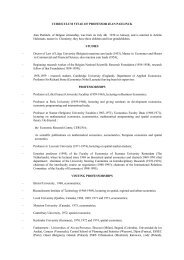PUBP 502-007 - George Mason University
PUBP 502-007 - George Mason University
PUBP 502-007 - George Mason University
Create successful ePaper yourself
Turn your PDF publications into a flip-book with our unique Google optimized e-Paper software.
School of Public Policy Fall 2008<br />
<strong>George</strong> <strong>Mason</strong> <strong>University</strong> 218 Finley<br />
Professor Pfiffner 703-993-1417<br />
Governance and Policy Processes<br />
<strong>PUBP</strong> <strong>502</strong><br />
Purpose of course<br />
Governance is a term that includes, but is not limited to government. It implies the broad range<br />
of rules, regulations, relationships, and institutions that come together to produce the systems<br />
within which all societies operate. The purpose of this course is to take a broad view of<br />
governance in a U.S., comparative, and international context. First, democratic governance in<br />
the United States is examined and compared with other modern democracies. Second, focusing<br />
on the United States as a case study, important changes in the execution of public policy are<br />
examined as increasing portions of public policy in democratic, market-based nations are carried<br />
out by private sector and non-profit organizations. Third, the course will examine case studies<br />
in comparative public policy, focusing on differences in economic, political and governmental<br />
systems. The course will also examine international development, the European Union, and the<br />
place of the nation state in an increasingly interdependent world with a globalized economy.<br />
Objectives<br />
The goal of the MPP Program in the School of Public Policy is to prepare students for<br />
professional positions in public policy, including the executive or legislative branches in the<br />
national, state, or local governments; private sector businesses dealing with public policy; and<br />
non-profit organizations concerned with public policy. Students should view this class as an<br />
opportunity for professional development.<br />
Upon completion of this course, students will be able to identify and assess the impact of a<br />
variety of governmental structures; be familiar with contemporary issues of governance;<br />
understand the varieties and implications of intersector cooperation; be aware of the changing<br />
dynamics of national and sub-national governance; and be conversant with international<br />
dimensions of governance.<br />
Required texts<br />
John Kingdon, America the Unusual (Belmont, CA: Wadsworth/Thompson Publishing, 1999).<br />
Elliott D. Sclar, You Don’t Always Get What you Pay For: The Economics of Privatization<br />
(Ithaca New York: Cornell <strong>University</strong> Press, 2000).<br />
Francis Fukuyama, State Building: Governance and World Order in the 21 st Century<br />
(Ithaca, NY: Cornell <strong>University</strong> Press, 2004).<br />
Alberto Alesina and Edward L. Glaeser, Fighting Poverty in the US and Europe<br />
(Oxford, UK: Oxford <strong>University</strong> Press, 2005).<br />
1
In addition, a number of articles and chapters will be assigned, as specified below or announced<br />
in class. Some course assignments will be sent to the class via e-mail to students’ GMU e-mail<br />
addresses. So, even if you do not regularly use your GMU e-mail account, be sure to open it and<br />
place a forwarding address to the account you use regularly so that you can get GMU, SPP, and<br />
class announcements. Also, be sure to empty your account regularly, because if you do not and<br />
it exceeds the limit, you will not receive incoming e-mail until you have cleared the space.<br />
Deleting forwarded e-mails does not delete them from your GMU account.<br />
Class Format<br />
The course will be conducted as a seminar rather than in a lecture format. Thus each week’s<br />
assignment must be read before class discussions each week. Active participation in class<br />
discussions is mandatory. Professionals in public policy must be able to speak effectively in<br />
small groups and to make presentations of their work. The only way to learn these skills is to<br />
practice, so students are expected to contribute to discussions and will be required to present<br />
summaries of course readings and their own writing. It is expected that students will keep up<br />
with policy developments in matters relating to this course by reading a good newspaper daily.<br />
Please turn your cell phone ringer off.<br />
Classroom Courtesy<br />
Civility and respect toward all members of the class are expected; disagreements among<br />
members of the class (or with the instructor) are useful and illuminating, but mutual respect is<br />
mandatory. Taking notes on your laptop is fine, but playing games, checking e-mail, or reading<br />
sports scores is not. If you do these things when I am talking, I will merely be annoyed. But if<br />
you do these things when another student is speaking, you will lose points on your class<br />
participation grade.<br />
Course Evaluation<br />
Midterm Quiz 20% Oct. 20<br />
Paper No. 1: Policy Memorandum 15% Oct. 27: due<br />
Oral Presentation of Memorandum 10% Oct. 27: begin<br />
Final Quiz 15% Dec. 1<br />
Class Participation 15%<br />
Paper No. 2: Comparative Policy Analysis 25% Dec. 1: due<br />
For purposes of this course, the grades of A or A- are reserved for sustained excellence and<br />
outstanding performance on all aspects of the course. The grades of B and B+ are used to<br />
denote mastery of the material and very good performance on all aspects of the course. The<br />
grade of B- denotes marginal quality work that is not quite up to graduate level standards. The<br />
grade of C denotes work that may be adequate for undergraduate performance, but is not<br />
acceptable at the graduate level. The grade of F denotes the failure to perform adequately on<br />
course assignments.<br />
Attendance in class is required and will be taken into account in evaluation for the course. While<br />
it is possible that the requirements of full time jobs may occasionally conflict with class times,<br />
missing more than two class sessions will make it virtually impossible to earn a grade better than<br />
2
B for the course. Missing more than three sessions will make a grade of C likely.<br />
Office Hours<br />
Mondays: 3 - 4pm (Arlington)<br />
Tuesdays: 3 - 4pm (Fairfax)<br />
Wednesdays: 3 - 4pm (Fairfax)<br />
Office: 218 Finley; Phone: 703-993-1417; e-mail: pfiffner@gmu.edu<br />
My office is Room 218 in the Finley Building on the Fairfax Campus. I am usually in<br />
my office four or five days a week and students are welcome to drop by at any time to<br />
talk. You may call me at any time (703-993-1417) or leave a message if I am not there.<br />
If you write to me via e-mail (pfiffner@gmu.edu), please put <strong>PUBP</strong><strong>502</strong> in the subject<br />
field, and I will get back to you quickly. Since this course is offered on the Arlington<br />
Campus, I will try to be on campus by 3:00pm afternoons before class, though at 4pm, I<br />
will be preparing for class until 4:30. I will also be available for consultation after each<br />
class.<br />
Outline of the course<br />
Weekly Topics and assignments:<br />
1. Introduction to the Course and Overview of the Semester<br />
(25 August)<br />
2. American Exceptionalism (i.e. the U.S. is different, not necessarily better)<br />
(8 September)<br />
Professional Vita or Resume due in class.<br />
Assignment:<br />
The Constitution of the United States of America, Articles I and II<br />
James Madison, Federalist No. 10<br />
James Madison, Federalist No. 51<br />
[The Constitution and the Federalist papers are easily found on the net. Merely<br />
type the terms into Google, and it will take you to a number of sites with the<br />
documents which can be downloaded.]<br />
John Kingdon, America the Unusual, whole book.<br />
3. Constitutionalism and the Rule of Law<br />
(15 September)<br />
Assignment:<br />
Seymour Martin Lipset, “The Social Requisites of Democracy Revisited,”<br />
American Sociological Review Vol. 59, No. 1 (February 1994), pp. 1-22.<br />
Access through Library data bases or JSTOR.<br />
Pfiffner, Power Play, Ch. 4, pp. 56-68, Ch. 9, pp. 229-249 (e-mail).<br />
3
4. Governing Markets: neo-classical economics and the standard market model<br />
(22 September)<br />
Assignment:<br />
Elliott D. Sclar, You Don’t Always Get What you Pay For: The Economics of<br />
Privatization, Chapters 1-4, pp. 1-93.<br />
5. Markets and Government: state and local cases<br />
(29 September)<br />
Assignment:<br />
Elliott D. Sclar, You Don’t Always Get What you Pay For, Ch. 5-7, pp. 94-168.<br />
6. Bureaucracy and Public Management<br />
(6 October)<br />
Assignment:<br />
William G. Ouchi, “Markets, Bureaucracies, and Clans,”<br />
Administrative Science Quarterly Vol. 25, No. 1(March 1980), pp. 129-141.<br />
Max Weber, Bureaucracy: “Characteristics of Bureaucracy,” and<br />
“The Position of the Official.” (about 3-5 pages).<br />
James Pfiffner, “Traditional Public Administration versus The New Public Management:<br />
Accountability versus Efficiency,” (e-mail)<br />
7. International Organizations: The European Union<br />
(14 October TUESDAY)<br />
Guest seminar by Professor Desmond Dinan, Jean Monet Professor, SPP<br />
Assignment:<br />
Desmond Dinan, “Reconstituting Europe,” found at:<br />
http://mason.gmu.edu/~pubp<strong>502</strong>/<br />
Jack Rakove, “Europe’s Floundering Fathers,” Foreign Policy No. 138<br />
(Sep.-Oct 2003), pp. 28-38.<br />
8. Economics and Welfare Policy<br />
(20 October)<br />
Midterm Quiz on reading for Weeks 1-8 (30-40 minutes)<br />
Assignment:<br />
Alesina and Glaeser, Fighting Poverty, Ch. 1-3, pp 1-77<br />
9. The Nature of Political Institutions<br />
(27 October)<br />
Assignment:<br />
Alisino and Glaser, Fighting Poverty, Ch. 4-5, pp. 77-133.<br />
Policy Memorandum due in class. In-class oral presentations begin.<br />
10. Redistribution Policies<br />
(3 November)<br />
Assignment:<br />
Alisino and Glaeser, Fighting Poverty, Ch. 6-8, pp. 133-233.<br />
4
11. Contrasting Governmental Structures<br />
(10 November)<br />
Assignment (read in order):<br />
Juan J. Linz, “The Perils of Presidentialism,” Journal of Democracy<br />
Vol. 1, No. 1 (Winter 1990), pp. 51-69.<br />
Donald Horowitz, “Comparing Democratic Systems,”<br />
Journal of Democracy Vol. 1, No. 4 (Fall 1990), pp. 73-79.<br />
Seymour Martin Lipset, “The Centrality of Political Culture,”<br />
Journal of Democracy Vol. 1, No. 4 (Fall 1990), pp. 80-83.<br />
12. State Building: economics and public administration<br />
(17 November)<br />
Assignment:<br />
One page proposal for Paper No. 2 due in class (including outline and sources).<br />
Fukuyama, State Building, Ch. 1-2, pp. 1-92.<br />
13. Weak States and Democracy<br />
(24November)<br />
Assignment:<br />
Fukuyama, State Building, Ch. 13-4, pp. 92-123.<br />
Larry Diamond, “The Democratic Rollback,” Foreign Affairs (March/April 2008).<br />
14. Globalization and the Nation State<br />
(1 December)<br />
In-class Quiz on readings from Section 9-14 (30-40 minutes)<br />
Final Paper, Comparative Case Study, Due in Class<br />
Assignment:<br />
Steven Krasner, “Sovereignty,” Foreign Policy (Jan./Feb. 2001), p. 20.<br />
Edward Luck, “Rediscovering the State,” Global Governance<br />
(Jan.-Mar. 2002) Vol. 8, No. 1, p. 7.<br />
Written Assignments<br />
Each of the written assignments must be submitted in hard copy, but an electronic copy must be<br />
submitted in addition so that it can be checked through the School’s data base service that<br />
surveys published and non-published papers, articles, and books for possible plagiarism.<br />
Do not put your papers in a special cover; merely staple them in the upper left corner. All papers<br />
must be double spaced and in at least 12 point font on standard 8.5 x 11 inch paper. Papers must<br />
be written specifically for this course, not recycled from a previous assignment.<br />
The syllabus paper requirements hold for all students. Anything the instructor says orally should<br />
not be understood to waive any of the paper requirements on the syllabus. If you think that I<br />
have made an exception for you, e-mail me to confirm your understanding.<br />
In evaluating papers, degree-of-difficulty will be considered. Just as a perfectly executed swan<br />
dive may not receive as high a score as a slightly flawed full gainer with a twist, a paper that<br />
5
engages a difficult question or takes a creative approach to a public policy issue will receive<br />
more credit than a paper that takes a relatively straight-forward issue and addresses it in a<br />
pedestrian manner.<br />
Your value-added as a policy professional rests in part on your ability to get beneath the surface<br />
of public policy issues. You can only do this if you are familiar with sources that take in-depth<br />
approaches to policy problems. Superficial analyses are useful and can be found in newspapers,<br />
popular magazines, Wikipedia, and policy briefs by think tanks; feel free to use them in your<br />
written assignments. But you will find in-depth analysis of public policy issues in scholarly<br />
sources. Scholarly sources include books, professional journal articles, government reports,<br />
and some think tank pieces. Many public policy journals are available on-line in the GMU<br />
library data bases.<br />
You may not deal with the same topic in both written assignment.<br />
Paper No. 1: Policy Memorandum<br />
Choose a policy or program at the federal, state, or local level in the United States or another<br />
country and analyze the question of whether it should be implemented by a public or private<br />
(business or non-profit) organization. The policy you choose may be currently implemented in<br />
the public or private sector; you may recommend a change in policy or argue for the status quo.<br />
You may use popular newspapers or periodicals for the source of your case, or you may use<br />
scholarly literature; but you must use concepts from the scholarly literature to analyze the case<br />
(textbooks for this course are sufficient for this paper). In all cases be sure to cite your sources.<br />
Address your memorandum to an appropriate official in the legislative or executive branch of<br />
the government you choose. Your position is that of staff analyst and your purpose is to advise<br />
your superior on the merits of the arguments and advisability of contracting out the good or<br />
service in question or implementing the policy with government agencies. Be sure that you<br />
cover both sides of the argument so that your superior will not be blindsided in a public debate<br />
over the issue. You may merely present the pros and cons of public or private provision of the<br />
product or service, or you may make a recommendation to your superior.<br />
The difference between this and an actual memorandum is that you will cite the sources you have<br />
used in analyzing your choice of policy. You can use the course texts as background and as the<br />
basis for your analysis, but you cannot use a case directly from a course text. Be sure to cite the<br />
sources for the information you use. You must cite at least five scholarly sources (aside from<br />
newspapers) for your paper, including two from the assigned course readings. You may want to<br />
read the Sclar book, You Don’t Always Get What you Pay For, before you write your paper.<br />
Your memorandum will be approximately 750 words, three double spaced pages, not including<br />
citations. Citations must be in footnote (preferred) or endnote style. You may NOT use in-line<br />
references. The citation style required in this course is explained later in the syllabus.<br />
Paper No. 2: Research Paper in Comparative Public Policy Analysis<br />
6
The purpose of the second written assignment is to provide an exercise in research and analytic<br />
writing. You will be expected to find and use a number of scholarly sources that are relevant to<br />
your research project.<br />
Choose one public policy area in the United States whose implementation differs from a similar<br />
policy area in another country, for instance, education, health, transportation, drug regulation,<br />
etc. Briefly explain the public policy basis (e.g. law or origin) of the policy in each country, but<br />
your primary focus will be to explain why the two countries deal with the same policy in<br />
different ways. For instance the two countries may have different histories, values, cultures,<br />
governmental structures, distribution of power, or economies.<br />
You must use the concepts and ideas from this course, as well as any others that are useful. You<br />
must cite at least three texts from this course. At a minimum, you must also (in addition to<br />
the citations from the course) use and cite five different scholarly sources, such as articles<br />
from scholarly journals and/or books. Using merely the minimum number of references is not<br />
the most effective way to earn an A. The popular press, newspapers and magazines, are fine to<br />
use; but they are not scholarly sources. You are welcome to use the internet, but be aware of the<br />
nature of the site you are using. It may contain scholarly sources with full citations, which are<br />
fine to use. Be sure to cite all of the internet sources you use, author of the information if<br />
available, date accessed, and full URL. The paper may not exceed eight pages in length (not<br />
including citations).<br />
______________________________________________________________________________<br />
Analytical Writing<br />
For purposes of scholarly writing it is important to write analytically. Analytic writing is more<br />
than merely describing what others have said or describing institutions of government or public<br />
policy making (though description is often an essential aspect of analysis). Analysis involves<br />
more.<br />
In analysis you are asking and answering questions about the causes and consequences of<br />
whatever you are examining.<br />
You are seeking explanations for behavior.<br />
You are developing categories and frameworks that will help us understand political behavior<br />
and generalize insights from one case to other cases.<br />
Ask the question: Of what is this an instance?<br />
When analyzing scholarly writing:<br />
Engage different ideas.<br />
Show how they differ and where they agree.<br />
Compare and contrast.<br />
Contrast different methods of understanding a phenomenon.<br />
What different types of evidence are adduced to make a point?<br />
Contrast different perspectives or approaches to a topic.<br />
Judge whether the reasoning is valid.<br />
Does the author’s evidence support the conclusion of the article?<br />
In Writing an Essay, Remember:<br />
7
The introduction should say what the paper is about and how you will approach the topic.<br />
The paper should address one central question and have a thesis.<br />
The paper should be organized logically, with an evident structure.<br />
The reader should be told how each part of the paper is related to the other parts..<br />
Use subheadings to label different sections.<br />
Outline your paper after it is written to see if it flows logically.<br />
Proofread your paper for spelling and syntax.<br />
Be sure to cite all of your sources and use quotation marks when you use another's words.<br />
Plagiarism is using another’s words or ideas without giving proper credit. Plagiarism is a<br />
major scholarly sin; it is unethical, dishonest, and deceptive, and it has ended some<br />
people’s careers. It can easily be avoided by giving credit where credit is due.<br />
Hints<br />
The singular possessive is formed by adding an ’s (e.g. one president’s term was cut short),<br />
the plural by s’ (e.g. both presidents’ terms were cut short).<br />
The possessive for it is its: its = possessive, it’s = it is.<br />
If you cannot remember the rule for its, do not use an apostrophe and you will be correct.<br />
(That is, use “it is” rather than a contraction and its for the possessive.)<br />
Lead is in your pencil, but led is the past tense of the verb to lead.<br />
Effect is a noun and affect is a verb, almost always - if you do not know the exceptions,<br />
do not violate this rule of thumb.<br />
Cite is short for citation, site is a place (or web location), sight refers to eyes.<br />
Horses have reins, monarchs reign over countries, rain falls from the sky: e.g. The Queen<br />
reigns; the Prime Minister holds the reins of power in Parliament. In London it rains<br />
often.<br />
From William Strunk and E.B. White’s classic, The Elements of Style (NY: Macmillan, 1979),<br />
(pp. vii-viii).<br />
“Place a comma before a conjunction introducing an independent clause.”<br />
“Do not join independent clauses by a comma” (use a semicolon or a period).<br />
“The number of the subject determines the number of the verb.”<br />
“Use the active voice.”<br />
“Omit needless words.”<br />
“Make the paragraph the unit of composition.”<br />
“Revise and rewrite.”<br />
Citations for Research Papers<br />
The purposes of scholarly citations are several:<br />
1) To show the source for a direct quote or fact not commonly known.<br />
2) To give credit for an idea to the author of a work<br />
3) To show the reader that you are familiar with other scholarship on your topic or to indicate<br />
where further information or analysis can be found.<br />
4) You may also use endnotes to explain something in the text or comment on the source.<br />
The intention is to give the reader enough information to find the source you are using so that he<br />
or she can see if you have quoted it correctly, interpreted it soundly, done justice to the author<br />
cited, or do further research on the topic in question themselves.<br />
Format: use the standard Chicago Manual of Style format, also known as “Turabian.”<br />
(Chicago: <strong>University</strong> of Chicago Press, 1982), or most recent edition.<br />
8
Books:<br />
author, title (place of publication: publisher, date), page number(s).<br />
[Titles of books should be in italics or underlined.]<br />
Example:<br />
1. John Kingdon, Agendas, Alternatives, and Public Policies, 2nd ed. (New York:<br />
HarperCollins, 1995).<br />
After the first full citation, you may use a shortened version:<br />
e.g. 2. Kingdon, Agendas, Alternatives, and Public Policies, page number(s).<br />
Articles:<br />
author, title, name of journal (volume, number), page number(s).<br />
[Titles of articles should be enclosed in quotation marks, names of journals underlined or<br />
in italics.]<br />
Example:<br />
1. Theodore J. Lowi, “The State in Political Science: How We Become What We Study,”<br />
American Political Science Review Vol. 86, No. 1 (1992), pp. 1-7.<br />
After first full citation, you may use a shortened version:<br />
2. Lowi, “The State in Political Science,” p. 3.<br />
Chapters in edited Books:<br />
author of chapter (or article), title of chapter, “in” editor of book, title of book (place and<br />
date of publication), page numbers.<br />
Example:<br />
Hugh Heclo, “The Changing Presidential Office,” in James P. Pfiffner, ed. The<br />
Managerial Presidency (College Station, TX: Texas A&M <strong>University</strong> Press,<br />
1999), pp. 23-36<br />
Web Site Citations:<br />
In addition to author, title, etc, include the following information:<br />
full URL, date of access.<br />
Number endnotes consecutively for the whole paper, with each note referring to the number in<br />
the text with the number in superscript or parentheses. Endnote numbers should be placed at the<br />
end of the sentence containing the information being cited. A bibliography of all the sources<br />
used in the paper along with other useful sources may be useful or required.<br />
School of Public Policy on Plagiarism<br />
The profession of scholarship and the intellectual life of a university as well as the field of public<br />
policy inquiry depend fundamentally on a foundation of trust. Thus any act of plagiarism strikes<br />
at the heart of the meaning of the university and the purpose of the School of Public Policy. It<br />
constitutes a serious breach of professional ethics and it is unacceptable.<br />
Plagiarism is the use of another’s words or ideas presented as one’s own. It includes, among<br />
other things, the use of specific words, ideas, or frameworks that are the product of another’s<br />
9
work. Honesty and thoroughness in citing sources is essential to professional accountability and<br />
personal responsibility. Appropriate citation is necessary so that arguments, evidence, and<br />
claims can be critically examined.<br />
Plagiarism is wrong because of the injustice it does to the person whose ideas are stolen. But it<br />
is also wrong because it constitutes lying to one’s professional colleagues. From a prudential<br />
perspective, it is shortsighted and self-defeating, and it can ruin a professional career.<br />
The faculty of the School of Public Policy takes plagiarism seriously and has adopted a zero<br />
tolerance policy. Any plagiarized assignment will receive an automatic grade of “F.” This may<br />
lead to failure for the course, resulting in dismissal from the <strong>University</strong>. This dismissal will be<br />
noted on the student’s transcript. For foreign students who are on a university-sponsored visa<br />
(eg. F-1, J-1 or J-2), dismissal also results in the revocation of their visa.<br />
To help enforce the SPP policy on plagiarism, all written work submitted in partial fulfillment of<br />
course or degree requirements must be available in electronic form so that it can be compared<br />
with electronic databases, as well as submitted to commercial services to which the School<br />
subscribes. Faculty may at any time a submit student’s work without prior permission from the<br />
student. Individual instructors may require that written work be submitted in electronic as well as<br />
printed form. The SPP policy on plagiarism is supplementary to the <strong>George</strong> <strong>Mason</strong> <strong>University</strong><br />
Honor Code; it is not intended to replace it or substitute for it.<br />
(http://www.gmu.edu/facstaff/handbook/ad.html)<br />
10
James P. Pfiffner<br />
<strong>University</strong> Professor<br />
School of Public Policy<br />
Classroom Presentations for Public Policy Students<br />
Oral presentations are an essential component of the skill set of any public policy professional.<br />
And the only way to prepare yourself for public speaking is to practice, that is why presentations<br />
are required in my classes. Most often these are short presentations of about ten minutes. The<br />
following are some hints to help make your presentation most effective.<br />
Professional demeanor and dress:<br />
The assignment should be taken seriously, and dress should be appropriate. Do not wear jeans or<br />
t-shirts; your clothes should project professionalism. Stand up straight and look at your<br />
audience; glance down at your notes when you need to. Do not talk down to your notes; project<br />
your voice to the back of your audience. Try to speak slowly and articulate clearly. Prepare<br />
your talk. Go over your remarks sufficiently so that you are thoroughly familiar with the<br />
material.<br />
Do NOT read your essay:<br />
Speak from an outline; and use your notes effectively by glancing down at them when necessary.<br />
Essays composed to be read are less effective when heard aurally. Speak in your own voice and<br />
explain your ideas in your own words. Tell us about it; don’t read it to us.<br />
Power Point:<br />
You may use Power Point if it helps you present your ideas more effectively; e.g., for<br />
illustrations, diagrams, data, charts, graphs, or an outline. Do NOT put your talk on power point<br />
slides, and do NOT read from the slides.<br />
Organize your remarks:<br />
In your introduction frame the issue you are addressing, and present a brief overview of your<br />
remarks. Make sure the audience knows the main point of your talk so they can listen more<br />
effectively. Organize your talk in a logical manner and ensure that the audience knows how the<br />
separate parts fit together.<br />
Checklist:<br />
Dress professionally<br />
Speak from an outline<br />
Look at the audience and project to the back<br />
Do not read from Power Point slides<br />
Organize your talk effectively<br />
4400 <strong>University</strong> Drive, MS 3C6, Fairfax, Virginia 22030<br />
o) 703-993-1417; Fax: 703-993-2284; pfiffner@gmu.edu<br />
11



